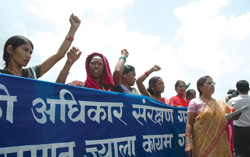|
|
| WAITING: Although Nepal signed the Convention on Elimination of All Forms of Discrimination Against Women in 1991, women\'s rights activists still say progress is slow. |
States sometimes need a little help in staying accountable for the well-being of their citizens and their rights. That's one of the reasons Nepal has, since the restoration of democracy in 1990, ratified 18 international human rights conventions.
In theory, this means that the state is responsible for both adhering to international laws, and making amendments to domestic ones so they conform to the spirit of the various conventions. Again, in theory, this means that if, for example, you are tortured in Nepal, or discriminated against on the basis of your gender, or denied the right to an education or the vote, there is legal redress.
The signing of some conventions did have positive fallout, as new ministries and commissions were formed. Nepal signed the Convention on the Elimination of All Forms of Discrimination Against Women (CEDAW) in April 1991, and the next month, the International Convention on Elimination of All Forms of Racial Discrimination, and the Convention Against Torture and Other Cruel, Inhuman or Degrading Treatment or Punishment. "As a result, the Ministry of Women, Children, and Social Welfare was formed in 1995, the Torture Compensation Act was passed in 1996, and the National Dalit Commission was also established," says Kedar Paudel, Joint Secretary at the Ministry of Law, Justice, and Parliamentary Affairs.
Nepal is now a party to 18 UN conventions relating to human rights.
But that's only part of the story. For six of these conventions, being a signatory means that the state is obliged to send regular reports to the treaty body for review. Over the past decade, Nepal has consistently missed report deadlines. In 1991 when the Convention Against Torture was ratified, the government agreed to send an initial report after the first year and periodic reports every four years after that. After the first report was filed, Nepal sent the next one in 2005-a combined report from the last twelve years.
Paudel argues that there were genuine reasons for non-compliance. "At first there was confusion over what department or ministry was responsible for the reporting process, and there was a language barrier because the report had to be in English. We did not have experts who understood UN guidelines, and bringing in outsiders meant we needed extra resources." Finally, in 2003, the government divided up the reporting work, and today four ministries are responsible for sending the periodic reports to the respective treaty committees, a development human rights groups here say is a major step forward.
Lawyer Sapana Pradhan Malla of Forum for Women, Law, and Development cautions against equating better compliance with treaty requirements with actual progress on the ground, citing the example of positive decisions by the judiciary on laws related to CEDAW in particular. The Law Ministry and parliament were both supportive, but, Malla says, many of the legal changes came about only after intense lobbying by women's interest groups. "The effectiveness of laws depends on the level of awareness of those who claim their rights, and on their ability to make the government accountable. We still have discussions about CEDAW, we conduct regular trainings for government, judiciary, and civil society members, we've conducted comparative studies and distributed a Nepali translation of CEDAW too," she explains.
Paudel, from the Ministry of Law, adds that because implementation is always going to be a challenge for the government, civil society has a big role to play in lobbying and disseminating information. "International laws have created rights for the people and given obligations to the state. The state has the responsibility to fulfil these obligations, but interest groups and civil society can assist us in informing people of their rights," he says.
Civil society groups say Nepalis need to actively use the international conventions as tools to demand their rights. "Instead of saying that the government signed these conventions without making necessary arrangements for infrastructure," argues Malla, "we should use these laws to make the government accountable."



